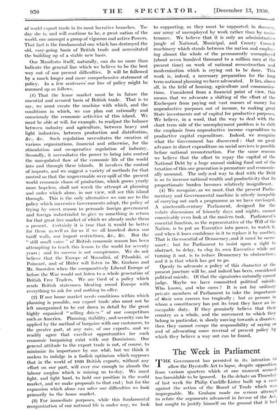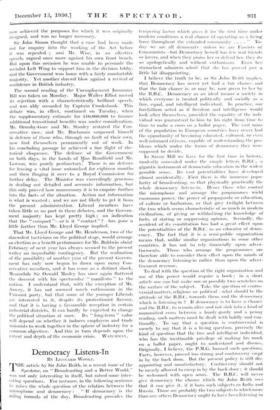The Week in Parliament
THE Covernent has persisted in its intention to :a
allow the Dyestuffs Act to lapse, despite opposition from various quarters which at one moment seemed too formidable to be ignored. In the debate on Thursday of last week Sir Philip Cunliffe-Lister built up a case against the action of the Board of Trade which was impregnable. Mr. Graham made no serious attempt to refute the arguments advanced in favour of the Act, but sought to justify himself on the ground that it had now achieved the purposes for which it was originally designed, and was no longer necessary.
Sir John Simon thought that a ease had been made out for enquiry into the working of the Act before it was repealed ; and Mr. Wise, in an effective speech, argued once more against his own front bench. But upon this occasion he was unable to persuade the socialist Left Wing to support him in the division lobby, and the Government won home with is fairly comfortable majority. Yet another shrewd blow against a revival of confidence in British industry.
The second reading of the Unemployment Insurance Bill was taken on Monday. Major Walter Elliot moved its rejection with a characteristically brilliant speech, and was ably seconded by Captain Crookshank. This debate was, in effect, continued on Tuesday, when the supplementary estimate for £10,000,000 to finance additional transitional benefits was under consideration. Mr. Ormsby-Gore and Mr. Stanley restated the Con- servative case, and Mr. Buchanan surpassed himself in defence of those who, through no fault of their own, now find themselves permanently out of work. In his concluding passage he achieved a fine flight of rhe- torical eloquence. The defence of the Government on both •days, in the hands of Miss Bondfield and Mr. Lawson, was purely perfunctory. There is no defence for leaving a vital issue untouched for eighteen months and then flinging it over to a Royal Commission for further delay. The Minister was exceedingly generous in dealihg out detailed and accurate information, but this only proved how unnecessary it is to enquire further into the facts of the situation. Action not information is what is wanted ; and we are not likely to get it front the present administration. Liberal members have taken little or no part in these debates, • and the Govern- ment majority has kept pretty high ; an indication that the "compact"—or is it " contact" ?—has gone a little farther than Mr. Lloyd George implied.
That Mr. Lloyd George and Mr. Henderson, two of the shrewdest tacticians on the political stage, would arrange an election as a benefit performance for Mr. Baldwin about February of next year has always seemed to the present writer an improbable contingency. But the realization of the possibility of another year of the present Govern- ment has only now begun to dawn upon many Con- servative members, and it has conic as a distinct shock. Meanwhile Sir Oswald Mosley has once again fluttered the dovecot with his spectacular" manifesto " to the nation.. I understand that, with the exception of Mr. Amery, it has not aroused much enthusiasm in the l'ilionist party, but that some of the younger Liberals m.r interested in it, despite its protectionist flavour, and that it is having a favourable reception in certain industrial districts. It can hardly be expected to change the political situation at once. Its " long-term " value will depend on whether it induces employers and trade unionists to work together in the sphere of industry for a common objective. And this in turn depends upon the extent and depth of the economic crisis. WATCHMAN.















































 Previous page
Previous page